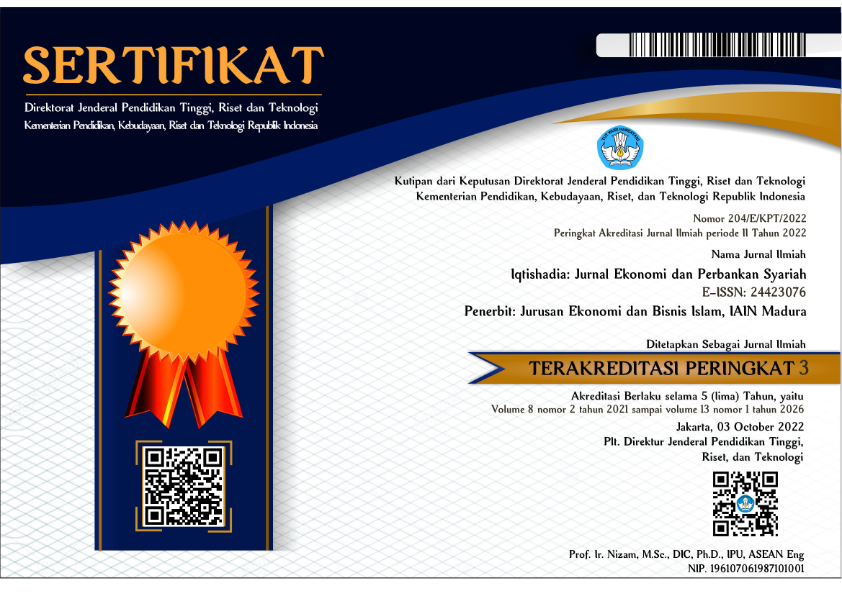MEMBANGUN MENTAL KEWIRAUSAHAAN SANTRI DI PONDOK PESANTREN RIYADLUL JANNAH MOJOKERTO
 Abstract views: 688
,
Abstract views: 688
,
 PDF downloads: 460
PDF downloads: 460
Abstract
Boarding school since last decade awareness has emerged to take certain steps to improve the quality of human resources that address the challenges and needs of social transformation ( development ). From this arises, the various models of human resource development. Either in the form of changes in the boarding school curriculum more oriented to the present or in the form of a kind of new institutional boarding agribusiness. And even in some boarding schools have adopted the advanced technology. Has taught a variety of technology based educational expertise and skills that lead to professional education. This emphasis on field skills increasingly demanded boarding school for self-supporting and self-financing. Therefore, many of them boarding school like in slug Jannah Riyadlul Mojokerto directing the (santrinya) to engage in vocational activities in agribusiness ventures include snacks food agriculture, livestock, fisheries, trade, lestoran, industrial development and so on. Even the boarding school riyadlul slugs mojokerto Jannah has several business units as a vehicle for learning these skills through entrepreneurial skills of the students raised. To then be directed towards the development of the management of economic enterprises when the students return to masyarakat. Research aims to develop students who performed mental entrepreneurship boarding school in Jannah riyadlul slugs mojokerto as an object of research . The success of this program thanks to the full support of caregivers, administrators and all who are within the SDM boarding Riyadlul Jannah Mojokerto, the enthusiasm of the students and the parents of the students in the following activities, support from the government and local communities. And barriers experienced in the program over to individual students because students who come from families or the environment department were at his home when it is the most dominant factor influencing students to be lazy. Development of teaching and learning activities in preparing entrepreneurs should balance between theory and practice debriefing proportionally. Practice developing learning skills through real work who are interested in how to put it in a curricular or extra- curricular activities scheduled as long as the neat, so it does not interfere with the other. Development of learning materials provided to students should not be simply related to learning practical skills alone, but also entrepreneurship education should be given so that they actually have a stock to become entrepreneurs. Boarding attempts to equip learners with science and technology as well as a variety of practical skills is expected to be the right solution for their prepare become independent people with entrepreneurial activity.
Downloads
References
Abdullah, Abdul Rahman Haji, Pemikiran Islam Tradisional di Nusantara: Pertumbuhan dan Perkembangannya Hingga Abad Ke 19. (Selangor: Dewan Bahasa Dan Pustaka, 1990.
Azra, Azyumardi, Pendidkan Islam, Tradisi dan Modernisasi Menuju Millenium, Jakarta: Logos, 2000
Chourmani I dan Prihatin, Pengantar Ilmu Ekonomi Proyek Pembinaan Dan Peningkatan Mutu Tenaga Kerja Kependidikan, Jakarta: Ditjen Dikti Diknas, 1994.
Dhofier, Zamakhsyari, Tradisi Pesantren, Studi Tentang Pandangan Hidup Kyai, Jakarta: LP3ES, 1982.
Dokumentasi Pondok Pesantren Riyadlul Jannah Pacet Mojokerto.
htt://m.okezone.com/read/2012/07/04/450/658470/tanamkan-jiwa-entrepreneurship-di-kalangan-santri
http://www.pikiran-rakyat.com/cetak/0704/15/1103.htm
http://ejournal.stainpurwoketro.ac.id/index.php/insania/article/download/180/170
Hall, C. Wirausaha yang bertanggung, USA: Pustaka Tenaga dan Career Press, 2004
Hakim, R., Kiat Sukses Wirausaha. Jakarta: Grasindo, 1998.
Iwantono, Kiat Sukses Berwirausaha, Strategi Baru Mengelola Usaha Kecil dan Menengah, Bandung: Grasindo, 2003
Masyhud, H.M., Sulton dan Moh. Khusnurdilo, Manajemen Pondok Pesantren, Jakarta: Diva Pustaka, 2003.
M. Ridlo Zarkasyi, Virus Entrepreneurship Kyai. Jakarta: ReneBook, 2011.
Meredith G.G., Kewirausahaan, Teori dan Praktek, Jakarta: PPM, 2002.
Purnama S. Teori Model, Yogyakarta: BPFE UGM, 2002.
Sukamto, Kepemimpinan Kiai Dalam Pesantren, Jakarta: LP3ES, 1999.
Silalahi, Ulber, Metode Penelitian Sosial. Bandung: UNPAR PRESS, 2006.
Simarmata, Dj. A. Operation Research Sebuah Pengantar, Jakarta: PT Gramedia, 1983.
Sugiyono, Metode Penelitian Pendidikan, Bandung: Alfabeta, 2009.
Suyanto, M., Smart in Entrepreneur, Belajar dari Kesuksesan Pengusaha Top Dunia, Yogyakarta: Andi Offset.
Tohar, M., Membuka Usaha Kecil, Yogyakarta: Kanisus, 2004.
Dhofier, Zamakhsyari, Tradisi Pesantren Studi Tentang Pandangan Hidup Kyai, Jakarta: LP3ES, 2003.
The journal operates an Open Access policy under a Creative Commons Non-Commercial Share-Alike license. All articles published Open Access will be immediately and permanently free for everyone to read and download.
• Creative Commons Attribution-NonCommercial (CC-BY-NC)

Iqtishadia: Jurnal Ekonomi dan Perbankan Syariah by http://ejournal.iainmadura.ac.id/index.php/iqtishadia is licensed under a Creative Commons Attribution-NonCommercial 4.0 International License.
Based on a work at http://ejournal.iainmadura.ac.id.


























